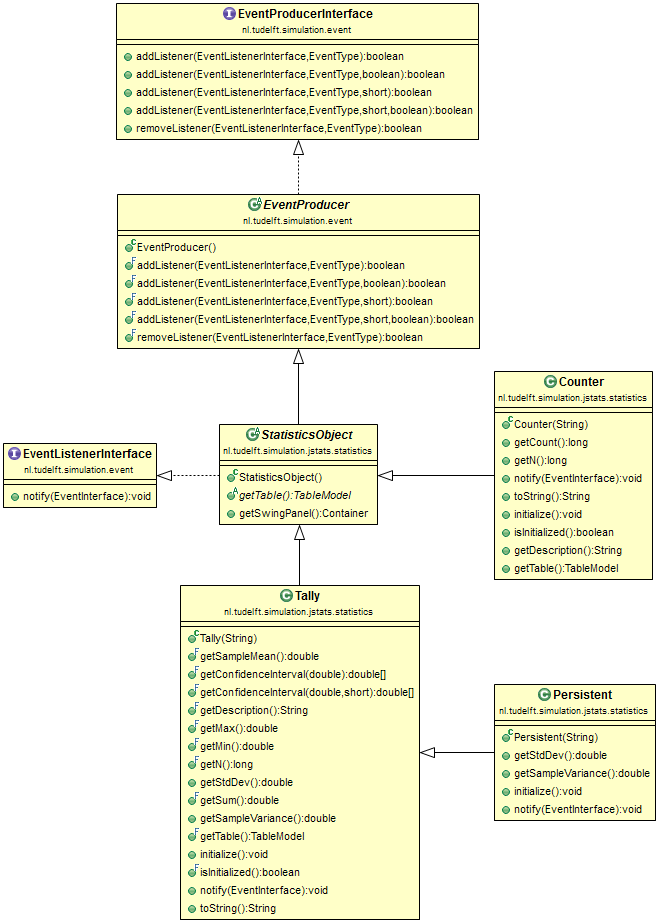Output Statistics¶
Statistics classes¶
DSOL provides three standard statistics classes: the Counter, the Tally, and the Persistent. The classes have the following functions:
- the Counter provides a count of something happening in the model we are interested in. An example is the number of a certain type of events that happened, e.g. the number of entities processed or the number of entities created.
- the Tally provides base unweighed statistics of the observations that are given, such as average, standard deviation and number of observations.
- the Persistent provides time-weighed statistics of the (time, observation) pairs that are given. The time-weighed average takes into account how long each value has held a certain value. An example is queue length: when the queue was 10 minutes of length 1, and 5 minutes of length 2, the average queue length is not 1.5 but (10 x 1 + 5 x 2) / 15 = 1.33.
The classes have the following relations:

Use of events in statistics classes¶
The diagram above shows that all statistics objects are both an EventProducer and an EventListener. The observations are given to the ststistics objects using events, and the statistics produce events that the status has changed after receiving events. This enables loose coupling between the model, statistics objects, and user interfaces showing the current state of the statistics objects. Using the publish-subscribe mechanism (see Advanced Topics for the inner working of the pub-sub mechanism), statistics objects are kept up-to-date with the latest observations.
Suppose that a DsolModel wants to keep a Tally object updated about the waiting time of an entity. The AbstractDsolModel is already an EventProducer. This means that it can already fire events to listeners. When the model is instantiated, it can either make the statistics classes itself, or allow external code (e.g., the public static void main method) to make the stastistics class for the model. Suppose the model makes the Tally object itself in the constructor, the following code shows how to arrange the subscription:
public class QueueModel extends AbstractDsolModel.TimeDoubleUnit<SimulatorInterface.TimeDoubleUnit>
{
public static final EventType WAITING_TIME_EVENT = new EventType("WAITING_TIME");
public QueueModel(final SimulatorInterface.TimeDoubleUnit simulator)
{
super(simulator);
Tally tally = new Tally("Waiting time");
}
public void constructModel() throws SimRuntimeException
{
// ...
fireEvent(WAITING_TIME_EVENT, waitingTime);
// ...
}
}
The loose coupling means that the model does not need to know that a Tally is listening to the WAITING_TIME_EVENT. It could also be a completely different object, or multiple Tallies and/or other objects that listen to the waiting time observation. A Persistent listener expects a TimedEvent instead of an Event. Use the fireTimedEvent method rather than the fireEvent method in case of possible Persistent listeners (or other listeners that are interested in the time of the observation).
When elsewhere in the code we are interested in the mean of the tallied waiting times, we can use the following code (suppose that the pointer to the Tally object is stored in this.waitingTimeTally):
System.out.println("Average waiting time: " + this.waitingTimeTally.getSampleMean());
Simulation-aware statistics classes¶
the Counter, the Tally, and the Persistent classes have been extended into SimCounter, SimTally, and SimPersistent to provide simulation-aware versions of the base statistics classes. The fact they are simulation-aware has a couple of advantages:
- They automatically subscribe to the Simulator's
WARMUP_EVENTandEND_REPLICATION_EVENT. Statistics are cleared when the warmup time has been reached, and at the end of the replication, results of the statistics objects are stored. - They are registered in the so-called
Contextof theSimulator. This is a hierarchical JNDI storage area that is accessible from other code and can be used to access statistics objects from other applications. - The
TimedEventof theSimPersistentis aware of the exact type of absolute time that the simulator uses, which can be used to calculate time intervals based on the absolute time type.